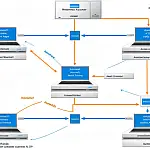What Makes PHP 8 Stand Out vs Previous VersionsPHP 8 is revolutionizing web development with its powerful features and improved performance. Discover how it outshines previous versions in this comprehensive comparison.
PHP 8 is the most recent version of the popular programming language, and it includes a slew of exciting new features and enhancements. In this post, we'll look at what distinguishes PHP 8 from its predecessors and how it's changing web development. PHP 8 is creating ripples in the developer world, with everything from performance improvements to new syntax and features. Let's have a look at what makes PHP 8 special.
Introduction to PHP 8 and its Significance in Web Development
PHP 8 is the most recent version of the popular programming language, and it is creating waves in the world of web development. PHP 8 is revolutionising the way websites and applications are produced because of its powerful features and better speed. In this post, we will look at PHP 8 and how it is changing the game for developers. PHP 8 is setting a new standard in web development, from improved performance to new syntax and functionality. Let's have a look at PHP 8 and see why it's such a huge changer.
Enhanced Performance and Speed Improvements in PHP 8
One of the main reasons PHP 8 is a game changer is its improved performance and quickness. PHP 8 provides considerable performance improvements over earlier versions, allowing websites and applications to function faster and more efficiently. This is accomplished through several optimisations and improvements to PHP's underlying engine. When adopting PHP 8, developers should expect faster response times, lower memory utilisation, and overall increased performance. These changes make PHP 8 a top choice for web developers who value speed and performance in their projects.
Introduction of New Features and Functionalities in PHP 8
In addition to increased efficiency, PHP 8 includes a slew of new features and functionalities that expand the language's capabilities. The introduction of the JIT (Just-In-Time) compiler, which enables significantly faster execution of PHP code, is one of the most notable advancements. This means that developers should expect their programs to load faster and perform better overall.
Union Types in PHP 8
The advent of union types, which provides greater flexibility in type declarations, is another interesting innovation in PHP 8. Developers can use union types to express that a variable can accept many kinds, increasing adaptability and lowering the need for extensive type checking.
Named Arguments in PHP 8
PHP 8 now introduces named arguments, which make working with functions with a large number of parameters easier. Developers can now provide the parameter name when invoking a function instead of relying on the sequence of parameters, making the code more understandable and less prone to errors.
Consider a function with multiple parameters like this:
function createUser($name, $email, $role, $isVerified) {
/ Function logic
} With named arguments, you can call this function as follows:
createUser(
name: 'John Doe',
email: 'john@example.com',
role: 'user',
isVerified: true
); You can choose to specify only the arguments you need, even if they are not in the order defined by the function. For example:
createUser(
isVerified: true,
name: 'John Doe',
email: 'john@example.com'
); Named arguments work well with parameters that have default values. You can specify only the parameters you want to change while keeping the default values for others:
function createUser($name, $email, $role = 'user', $isVerified = false) {
/ Function logic
}
createUser(name: 'John Doe', email: 'john@example.com', isVerified: true); Named arguments are a powerful feature that improves code readability and makes it easier to understand function calls, especially for functions with many parameters. They help prevent errors related to parameter order and reduce the need to rely on documentation for understanding function usage.
Attributes in PHP 8
In PHP 8, attributes allow you to add metadata to your code that can be used for a variety of purposes such as validation, documentation, and autoloading. They let you annotate your classes, functions, properties, and other objects with structured information. Here's an example of how to utilise attributes in PHP 8:
To create an attribute, you define a class that is marked with the `#[Attribute]` attribute itself. Here's an example of a simple attribute class.
#[Attribute]
class MyCustomAttribute {
public $value;
public function __construct($value) {
$this->value = $value;
}
}
Here's an example of how to apply the MyCustomAttribute to a class, method, and property:
#[MyCustomAttribute('Class attribute')]
class MyClass {
#[MyCustomAttribute('Property attribute')]
public $myProperty;
#[MyCustomAttribute('Method attribute')]
public function myMethod(#[MyCustomAttribute('Parameter attribute')] $param) {
/ Method logic
}
} You can retrieve attribute information at runtime using reflection. Here's an example of how to access attribute data for a class, method, and property:
$reflector = new ReflectionClass(MyClass::class);
$classAttributes = $reflector->getAttributes(MyCustomAttribute::class);
$propertyAttributes = $reflector->getProperty('myProperty')->getAttributes(MyCustomAttribute::class);
$methodAttributes = $reflector->getMethod('myMethod')->getAttributes(MyCustomAttribute::class); The ReflectionClass, ReflectionProperty, and ReflectionMethod classes allow you to inspect classes, properties, and methods, respectively, and retrieve attribute data.
Match Expressions in PHP 8
In PHP 8, the match expression is a more advanced and secure replacement to the traditional switch statement. It simplifies the code and makes it more predictable. In PHP 8, here's how to utilise the match expression, the basic syntax of the match expression is as follows:
$result = match ($value) {
'option1' => 'Result 1',
'option2' => 'Result 2',
'option3' => 'Result 3',
default => 'Default Result',
}; You can use variables within the match expression.
$color = 'red';
$result = match ($color) {
'red' => 'You chose red!',
'blue' => 'You chose blue!',
default => 'You chose a colour I don't know!';
}; You can have multiple conditions in a single branch.
$result = match ($value) {
'option1', 'option2' => 'Result 1 or 2',
'option3' => 'Result 3',
default => 'Default Result',
}; The match expression can also be used for error handling.
function divide($numerator, $denominator) {
return match (true) {
$denominator == 0 => 'Division by zero is not allowed',
default => $numerator / $denominator,
};
} These are just a few of the new features and functions included with PHP 8. With these changes, PHP 8 cements its status as a game-changer in web development, providing developers with a powerful and efficient tool for constructing high-performance applications.
Comparison of PHP 8 with Previous Versions
PHP 8 introduces considerable enhancements and new features that distinguish it from earlier versions. The JIT (Just-In-Time) compiler is one of the most notable features, since it improves the execution speed of PHP code, resulting in faster load times and overall performance. Furthermore, PHP 8 adds union types, which allow developers to define that a variable can accept several types, enhancing flexibility and decreasing the need for sophisticated type verification. Another significant feature is named arguments, which allow developers to provide the parameter name when invoking a function, making it easier to work with functions that have several parameters. These improvements confirm PHP 8's position as a game-changer in web development, giving developers with a powerful and efficient tool for building high-performance applications.
Benefits of Upgrading to PHP 8 for Developers and Businesses
PHP 8 has various advantages for both developers and organisations. The JIT compiler dramatically enhances the execution speed of PHP code, resulting in shorter load times and enhanced overall performance for developers. This enables developers to design high-performance applications capable of handling heavier workloads and providing a better user experience. Furthermore, the inclusion of union types increases variable declaration flexibility, decreasing the need for extensive type checking and making code more concise and understandable. Named arguments also make working with functions with multiple parameters easier, making code more manageable and understandable.
Upgrading to PHP 8 might result in cost savings and better productivity for enterprises. PHP 8's improved performance and efficiency can save server costs and speed up website loading times, resulting in a better user experience and potentially higher conversion rates. PHP 8's new features and additions also allow developers to create more powerful and scalable applications, allowing businesses to fulfil their consumers' expanding demands while staying ahead of the competition. Overall, upgrading to PHP 8 is a wise investment for developers and businesses seeking to capitalise on the most recent improvements in web development technology.









